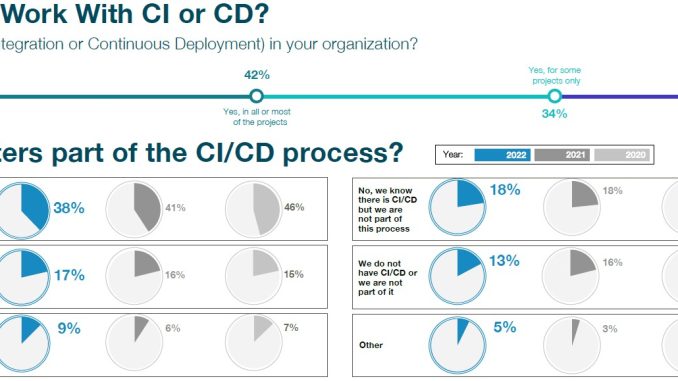PractiTest has released its ninth annual State of Testing® report. This year’s report shows changes in the way software developers think about testing, highlights a shift in the way testers perceive their role, and includes a new section on the impact Agile and DevOps play on testing.
The State of Testing report is the largest annual survey that seeks to identify the current characteristics, practices, and challenges facing the software testing community. With on average 1,500 participants from more than 80 countries, the survey provides an interesting perspective of the software testing profession and the global testing community.
The most important findings center on transformation within software development organizations. Standalone test teams are shrinking. Over the last year, we’ve seen a 15% decrease in organizations with dedicated testing teams of 6 or more members. Testers are being integrated into larger teams, modifying the dynamics and testing approach within the organization. The number of testers who define themselves as engineers has gone up by 14%. This is in stark contrast to the way testing was viewed and conducted a few years ago and is reflective of larger changes taking place within the field of testing.
“This year’s report shows improved collaboration between testers and developers. Testers are more involved in projects, and are fulfilling the role of testing coaches within the development team,” said Yaniv Iny, CEO at PractiTest. “When viewed in that light, it’s no surprise that nearly one in five hiring managers view communications and soft-skills as the most desirable skills in their recruits.”
Key Findings
For the first time, the survey included a section on the impact of Agile testing and DevOps. When asked about the impact of migrating from waterfall to iterative models, respondents identified multiple changes.

(Are software testers part of the CI/CD process – click on figure to enlarge)
Over 60% of respondents believed that DevOps and agile processes led to teams being more organized and stable, while 66% noted that development teams were releasing features more frequently with more functionality. Two-thirds reported that collaboration with developers is improved when applying DevOps processes. More than half indicated that fewer serious bugs were making it into production, while one-third reported that non-testers are involved in testing activities.
Testers maintain their involvement throughout the software’s lifecycle, effectively “Shifting Right” their testing efforts. More than half said they monitored software in production and deployment issues.
Skill Sets to Succeed as a Tester
The survey asked testers which skill sets they believed were important for them to be successful in their role. API testing, agile methodologies, and functional testing and scripting were all high on the list, scoring at least 95% each. Previous hot topics, including Big Data testing, IoT testing, and machine learning/AI testing, were only cited as important or very important by about 60% of respondents.
Testers overwhelmingly recognized the importance of communication in their role, and 90% felt they needed to coach or train other members within the team. This further underscores the idea that testers are being integrated more deeply into development teams, and need to share knowledge with team members who don’t come from a testing background.

